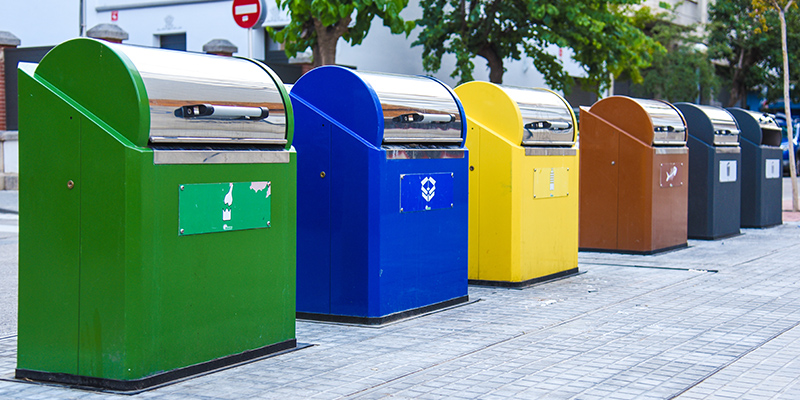Effective waste management for commercial buildings is key to maintaining an environment for business. For this type of property, you must have a specific plan to implement waste management properly. If mishandled, it may affect both the image of your property and the safety of the people who use it.
What is Waste Management and Why is it Important?
Waste management is properly handling waste until it is disposed of. This system is crucial to maintaining the cleanliness of an area, including commercial properties such as office buildings, shopping centers, and industrial facilities.
Some processes involved in waste management include waste collection, transportation, treatment, recycling (if the waste can be recycled), and disposal. Waste management also includes monitoring and regulating waste-related processes to ensure they do not harm the environment while complying with relevant laws.
The main goal of waste management is to reduce and minimize the negative impact of trash on the environment and human health. It also aims to promote the efficient and sustainable use of resources through reusing and recycling materials.
The Importance of Effective Waste Management
Commercial building waste management plays a significant role in maintaining the property. It also provides many benefits, including the following:
 Less Environmental Impact
Less Environmental Impact
Proper waste management ensures that trash is reused, recycled, or disposed of properly in a way that will not negatively affect nature and the environment. Natural resources like trees, metals, and water are also conserved thanks to the recycling effort that is part of waste management.
Helps Save Money
Even for commercial spaces, having a waste management system will save you money. By leveraging recycling efforts, you help lower your disposal costs by helping improve your business’ image.
Processes Improve Overtime
Part of waste management is understanding the type and amount of trash your commercial building generates. By noting this, you can look for ways to make the process more efficient and cost-effective while tailoring it to your needs.
Easier Reporting
A plan for waste management for commercial buildings includes tracking the processes in your commercial building. By streamlining it, it makes it easier to share information with stakeholders.
What is Commercial Waste?
Commercial waste involves the trash and waste materials produced during the day-to-day operations of your commercial building. Some of the most common types of commercial waste will fall under the following categories:
- General waste involves trash generated from day-to-day business tasks. This may include office supplies or packaging materials.
- Recyclable waste may be reused or processed to create an entirely new site. Some common recyclable waste materials include paper and cardboard, certain types of plastic, and metals.
- Hazardous waste can be dangerous when it comes into contact with people or, if disposed of improperly, harms the environment. Some examples are electronics, batteries, and chemicals.
When creating your waste management system, be sure to factor in these types of waste and their sources in your building.
Waste Management Strategies for Commercial Buildings
If you’re in the process of creating a waste management program for your commercial building, consider including the following:
Waste Segregation
A waste segregation system would make it easier to organize, transport, and process waste accordingly. Try to have a system of segregation of recyclable materials, organic wastes, and hazardous wastes in place.
 Recycling Program
Recycling Program
A good waste management system will have recycling programs. To implement this in your building, ensure areas where people can throw away recyclable items.
You may also reach out to people using your commercial buildings regularly and promote recycling.
Handling Organic Waste
Your waste management program should also outline how your building will handle organic waste. If your commercial building has amenities that allow composting, you can include this in your waste management plans.
Managing Hazardous Wastes
Many commercial buildings will have everyday waste items deemed hazardous when disposed of improperly, such as batteries, electronics, and chemicals. Part of running a commercial establishment responsibly is having a system for disposing of these wastes to protect people and the environment from possible harm.
Having Waste Reduction Initiatives
If possible, include efforts to reduce waste in your system. This entails trying to use reusable and recyclable items in the building while educating tenants about it.
Tips for Implementing a Waste Management Plan
Here are some of the best practices that you can do in implementing a waste management plan:
- Audit your current waste production. This will help you identify the sources of your waste and how much they produce. It enables you to make informed decisions when revising the rest of the plan.
- Develop a written waste management policy. By giving them a written reference, your tenants can understand regulations more easily.
- Make sure to monitor and report your commercial facility waste management plan. Check and review the results to assess areas you need to improve.
- Hire a waste management company to handle your system. They are well-equipped to handle commercial building waste disposal and management and usually offer tailored and technological solutions.
Frequently Asked Questions
Are There Laws for Waste Management for Commercial Buildings?
The regulations governing waste management vary per town, city, or state, but they usually outline proper waste disposal methods, segregation, recycling, and hazardous material disposal.
How Often Should Waste be Collected in Commercial Buildings?
This would depend on the size of the building, the type of business, and the amount of waste generated daily. Waste collection schedules vary based on the building’s needs, and the frequency may range from daily to weekly.
What are the Consequences of Poor Waste Management?
If your building does not have proper waste management, waste can accumulate, making the area unsanitary and unsightly. This can also cause air quality issues and contaminate soil and water.
Additionally, since most places have waste management regulations, mishandling the plan for your building may lead to legal penalties and fines.
A Proper Plan
Waste management for commercial buildings should be integral to your property’s operations and maintenance. It helps create a safe environment that is conducive to everyday living.
Maintenance Specialists, Inc. helps property owners upkeep their buildings and facilities. We offer numerous services, such as waste management assistance. Call us today at 704.405.6000 or contact us online for more details!
RELATED ARTICLES:

